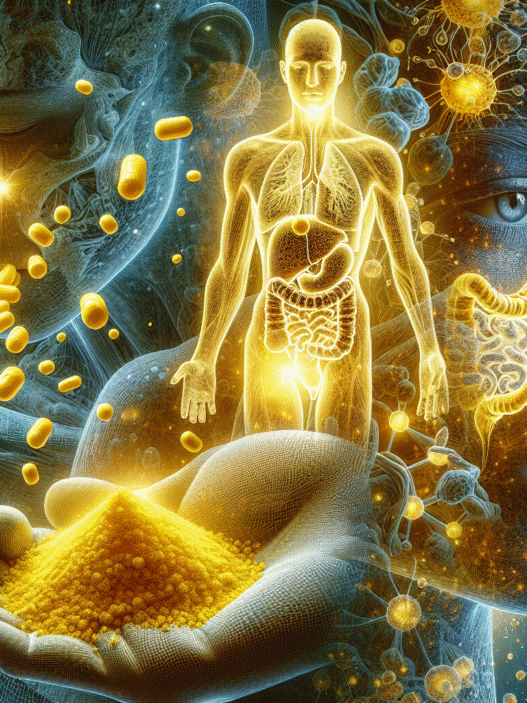Understanding Berberine’s Effects
Berberine, a compound found in various plants, has gained attention for its potential health benefits, particularly concerning digestion and overall wellness. This section explores the impact of berberine on the gut barrier, diabetes management, and cholesterol levels.
Impact on Gut Barrier
Berberine plays a significant role in maintaining the integrity of the gut barrier. A healthy gut barrier prevents harmful substances from leaking into the bloodstream, which can lead to various health issues. Although specific studies focusing solely on berberine’s direct impact on gut barrier functionality are limited, its anti-inflammatory properties may help support gut health overall.
Role in Diabetes Management
Berberine’s effectiveness in managing diabetes is notable. It may help lower glucose levels in individuals with diabetes by improving the body’s response to insulin and preventing the liver from producing excess glucose. Research indicates that berberine can significantly decrease blood sugar levels in those with type 2 diabetes. For example, a study conducted in 2008 found that taking 1 gram of berberine daily led to a 20% reduction in fasting blood sugar and a 12% decline in hemoglobin A1c levels (Healthline).
| Measurement | Before Berberine | After Berberine (1 gram/day) |
|---|---|---|
| Fasting Blood Sugar (%) | N/A | -20% |
| Hemoglobin A1c (%) | N/A | -12% |
Influence on Cholesterol Levels
There is also compelling evidence regarding berberine’s effect on cholesterol levels. Regular intake of berberine supplements has been shown to lower total cholesterol, “bad” cholesterol (LDL), and triglycerides in individuals with high cholesterol. Moreover, it may boost levels of HDL (good) cholesterol, potentially contributing to a reduced risk of heart disease. However, further research is needed to draw definitive conclusions on this benefit (WebMD).
| Cholesterol Type | Effect of Berberine |
|---|---|
| Total Cholesterol | Decrease |
| LDL (“Bad”) Cholesterol | Decrease |
| HDL (“Good”) Cholesterol | Increase |
| Triglycerides | Decrease |
By understanding these aspects of berberine, individuals interested in holistic health and functional medicine can better appreciate its potential benefits in the areas of digestion, diabetes management, and cholesterol regulation. For additional information on how berberine interacts with gut health, visit our article on berberine and gut health.
Berberine and Heart Health
Berberine has garnered attention for its potential benefits on heart health and weight management. Understanding these effects is important for those interested in improving their overall wellness through functional medicine.
Benefits for Heart Disease
Berberine is reported to influence cholesterol levels positively by helping to reduce total cholesterol and triglycerides while boosting HDL (good) cholesterol levels. This action may contribute to a lower risk of heart disease. Although further research is needed to confirm these effects definitively, some studies suggest it can play a role in heart health Healthline.
To illustrate the impact of berberine on cholesterol levels, here is a summary of findings:
| Parameter | Change with Berberine |
|---|---|
| Total Cholesterol | Reduced |
| Triglycerides | Reduced |
| HDL Cholesterol | Increased |
Impact on Weight Loss
Weight loss is another area where berberine has shown promise. Research suggests that berberine may help individuals reduce body mass index (BMI) and encourage weight loss. In a 12-week study, participants taking 500 milligrams of berberine three times per day experienced an average weight loss of 5 pounds and a reduction in body fat by 3.6% Healthline.
| Study Duration | Berberine Dosage | Average Weight Loss | Body Fat Reduction |
|---|---|---|---|
| 12 weeks | 500 mg, three times daily | 5 pounds | 3.6% |
Berberine’s potential weight loss benefits appear to warrant further inquiry, especially when compared to FDA-approved medications such as Ozempic WebMD.
For those interested in exploring berberine further, consider its various applications, including its interactions with blood pressure medications and overall health effects. To learn more about its other benefits, visit our page on berberine benefits or check out berberine and blood pressure for additional insights.
Interactions and Side Effects
Medication Interactions
Berberine can interact with various medications, particularly those used to manage diabetes. When taken alongside diabetes medications, berberine may cause blood sugar levels to drop too low. It is important for individuals to monitor their blood sugar closely when combining these treatments to avoid hypoglycemia (WebMD).
Additionally, berberine may interact with medications that influence blood clotting. It has the potential to slow blood clotting, which could heighten the risk of bruising and bleeding if taken with other anticoagulants. This caution is vital for those on blood-thinning therapies, emphasizing the need for consulting healthcare providers about combining treatments.
Another significant interaction involves cyclosporine, a medication used to prevent organ rejection. Berberine might affect the rate at which the body metabolizes cyclosporine, leading to heightened effects and side effects. Caution should be exercised to prevent potential complications in such cases.
| Medication Type | Interaction with Berberine |
|---|---|
| Diabetes Medications | May lower blood sugar excessively |
| Blood Thinners | May increase bruising and bleeding risk |
| Cyclosporine | May increase effects and side effects |
Potential Blood Pressure Effects
Berberine may also play a role in managing blood pressure levels. Studies have indicated that it can lower blood pressure, potentially leading to hypotension if used in conjunction with other antihypertensive medications. For those on blood pressure medications, it is crucial to monitor blood pressure closely to avoid dropping it too low.
Monitoring provides necessary information to ensure safe usage and effective management of blood pressure.
| Effect | Potential Impact |
|---|---|
| Blood Pressure Reduction | Risk of hypotension with other antihypertensives |
In summary, while berberine offers numerous health benefits, awareness of its interactions with medications and its effects on blood pressure is essential. Always consult healthcare professionals before starting any new supplements, especially when managing chronic conditions. For further reading on how berberine supports various health aspects, explore berberine and digestion and the broader array of berberine benefits.
Berberine and Gut Microbiota
The relationship between berberine and gut microbiota is an emerging area of interest in functional medicine. This compound has shown significant potential in modulating gut health and influencing the composition of the microbiome.
Modulating Gut Microbiome
Berberine has demonstrated the ability to regulate the gut microbiome, particularly in the context of metabolic disorders associated with a high-fat diet. It has been found to upregulate beneficial bacteria, such as Akkermansia spp., which play a crucial role in improving gut health and managing various diseases.
The modulation of gut microbiota by berberine enhances insulin sensitivity and affects lipid metabolism, with a direct impact on the composition and abundance of specific bacterial populations. The following table summarizes the key effects of berberine on gut microbiota:
| Effect of Berberine | Result |
|---|---|
| Upregulates Akkermansia spp. | Improves gut health and metabolic disorders |
| Alters bacterial composition | Reduces harmful bacteria, increases beneficial bacteria |
| Suppresses intestinal inflammation | Reduces inflammatory responses in the gut |
| Activates intestinal farnesoid X receptor | Mediates metabolism of bile acids, lipids, and glucose |
By promoting a healthy balance of gut bacteria, berberine can improve gut functionality, which is essential for overall health.
Effects on Intestinal Diseases
The manipulation of gut microbiota by berberine extends to its potential benefits in combating intestinal diseases. Research indicates that berberine can reverse imbalances in gut bacteria associated with conditions such as hyperlipidemia, diabetes, cancer, and various inflammatory diseases (NCBI).
In disease states characterized by dysbiosis (an imbalance of gut bacteria), berberine has shown promise in restoring microbial diversity and functionality. This restoration is significant, as a diverse microbiome is critical for a robust immune response and metabolic health.
| Disease State | Effect of Berberine |
|---|---|
| Hyperlipidemia | Decreases harmful bacterial activity and lipid accumulation |
| Diabetes | Improves insulin sensitivity and bacterial diversity |
| Inflammatory Diseases | Reduces inflammation and promotes beneficial bacteria |
| Intestinal Disorders | Enhances gut barrier function and microbial balance |
Berberine’s capacity to influence the gut microbiota illustrates its potential as a therapeutic agent for improving digestive health and treating intestinal diseases. For those interested in exploring the full spectrum of benefits, including its effects on berberine and digestion, understanding these interactions is key to harnessing berberine’s therapeutic potential.
Therapeutic Potential of Berberine
Treatment for Various Diseases
Berberine has a long history of use in traditional Chinese medicine to address various health issues, such as obesity, diabetes mellitus, and atherosclerosis. Clinical trials have demonstrated its effectiveness in treating cardiovascular, gastrointestinal, and endocrine diseases. Its low toxicity at standard doses is an appealing aspect for those exploring alternatives for health management.
Berberine’s therapeutic benefits include:
| Disease | reported effects |
|---|---|
| Obesity | Reduces body weight and improves metabolism |
| Diabetes Mellitus | Lowers blood glucose levels and improves glycol-metabolism (NCBI PMC) |
| Hyperlipidemia | Lowers total cholesterol, triglycerides, and LDL while boosting HDL levels (NCBI PMC) |
| Inflammatory Conditions | Reduces inflammation by inhibiting interleukins (NCBI PMC) |
Berberine’s influence on gut microbiota plays a pivotal role in managing these health conditions. For instance, it has been shown to enhance the populations of beneficial bacteria while reducing those linked to complications, particularly in individuals with diabetes.
Clinical Benefits and Toxicity
The clinical benefits of berberine extend to its role in improving metabolic disorders, mainly through its effects on the gastrointestinal microbiome. Studies reveal that berberine positively impacts gut health, which in turn contributes to its hypoglycemic effects. Its ability to modulate gut bacteria population promotes better metabolic regulation in patients suffering from diabetes (PubMed Central).
In terms of safety, berberine is recognized for its low toxicity profile when administered in standard therapeutic doses (NCBI PMC). This makes it a viable candidate for those interested in holistic wellness approaches.
Berberine’s broad therapeutic range, combined with its efficacy and safety, marks it as an essential component in discussions about health maintenance and disease treatment. For additional insights, refer to our articles on berberine benefits and berberine and gut health.
Mechanisms of Action
Understanding how berberine impacts health involves examining its regulation of cellular targets and its effects on metabolic disorders. These mechanisms illustrate how berberine can be an effective component in supporting overall well-being.
Regulation of Cellular Targets
Berberine exerts its therapeutic effects through the regulation of various cellular targets. Key proteins and pathways influenced by berberine include LDLR (Low-Density Lipoprotein Receptor), IR (Insulin Receptor), and AMPK (AMP-activated protein kinase) (NCBI).
| Target | Function | Effect of Berberine |
|---|---|---|
| LDLR | Binds and removes LDL cholesterol from the bloodstream | Upregulates expression, lowering cholesterol levels |
| IR | Mediates the effects of insulin, crucial for glucose uptake | Enhances sensitivity, improving glucose metabolism |
| AMPK | Energy sensor regulating lipid and glucose metabolism | Activates pathways that promote fat burning and reduce fat storage |
Berberine’s multifaceted effects make it a valuable candidate for therapeutic interventions, especially in chronic diseases like obesity and diabetes.
Impact on Metabolic Disorders
Berberine has been shown to improve metabolic disorders by modulating the gastrointestinal microbiota. This modulation can increase the populations of beneficial bacteria while reducing harmful bacteria associated with diabetes complications (PubMed Central).
| Metabolic Disorder | Effect of Berberine | Observed Outcomes |
|---|---|---|
| Diabetes Mellitus | Improves gut health | Decreased blood glucose levels |
| Hyperlipidemia | Alters gut flora composition | Reduced lipid levels in the blood |
| Inflammatory Bowel Disease | Exhibits anti-inflammatory properties | Improved gut inflammation and health |
By enriching beneficial gut bacteria and decreasing harmful ones, berberine contributes to its hypoglycemic effects and overall metabolic health. These findings suggest that berberine could be a key player in the treatment and management of metabolic disorders, emphasizing its relevance in discussions about berberine and digestion.
In summary, berberine’s ability to regulate cellular functions and its supportive role in metabolic conditions highlight its therapeutic potential. For more insights on berberine’s health benefits, explore our article on berberine benefits.





















